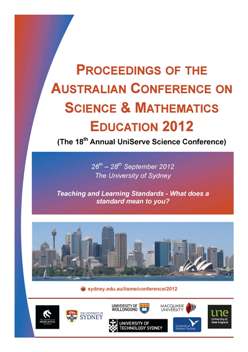Chemistry to biology knowledge transfer does it work? Mapping of TLO’s by multi-evaluation techniques
Abstract
Engaging and collaborative activities along with peer assessment allows students to deepen their discipline knowledge, practice team work and gain experience in judging the work of their peers. Thus these activities provide a rich context in which their learning is multi-faceted and is promoted in both discipline and generic domains, supporting the science threshold learning outcomes1. This learning was commenced in first year and then built on in a second year subject. Workshops that were based on active learning principles had previously been developed and used in large first year chemistry subjects2 . That innovation was implemented in another science discipline, with chemistry and biology teaching staff working collaboratively to introduce workshop sessions into BIOL213, a second year biochemistry subject. BIOL213 is largely a ‘service subject’ and has a failure rate of concern. The main aims of the teaching innovation were - to support knowledge transfer from one set of science discipline staff to another, to demonstrate proof of concept, to foster sharing of learning design across the faculty of science especially to research focused staff, to promote deeper student learning through active learning and consequently improve student performance. The evaluation of this innovation aimed to determine whether these teaching activities and assessment tasks had been effective in students achieving these learning outcomes, at threshold level or above, and to help map chemistry and biology disciplinary areas against the science TLOs. The project team were supported by advice, peer review, and leadership training from SaMnet action-learning team. 1.Jones, S and Yates B. 2011 SCIENCE Learning and Teaching Academic Standards Statement, September 2011. ISBN: 978-1-921856-29-7, http://www.olt.gov.au/system/files/resources/altc_standards_SCIENCE_240811_v3.pdf 2 O’BrienG and Bedford, S. (2012) Small group work in large chemistry classes: Workshops in First Year Chemistry. HEAcademy STEM Annual Conference 2012. http://www.heacademy.ac.uk/assets/documents/stem-conference/Physical_20Sciences/Glennys_OBrien.pdfDownloads
Published
2012-08-24
Issue
Section
Abstracts
